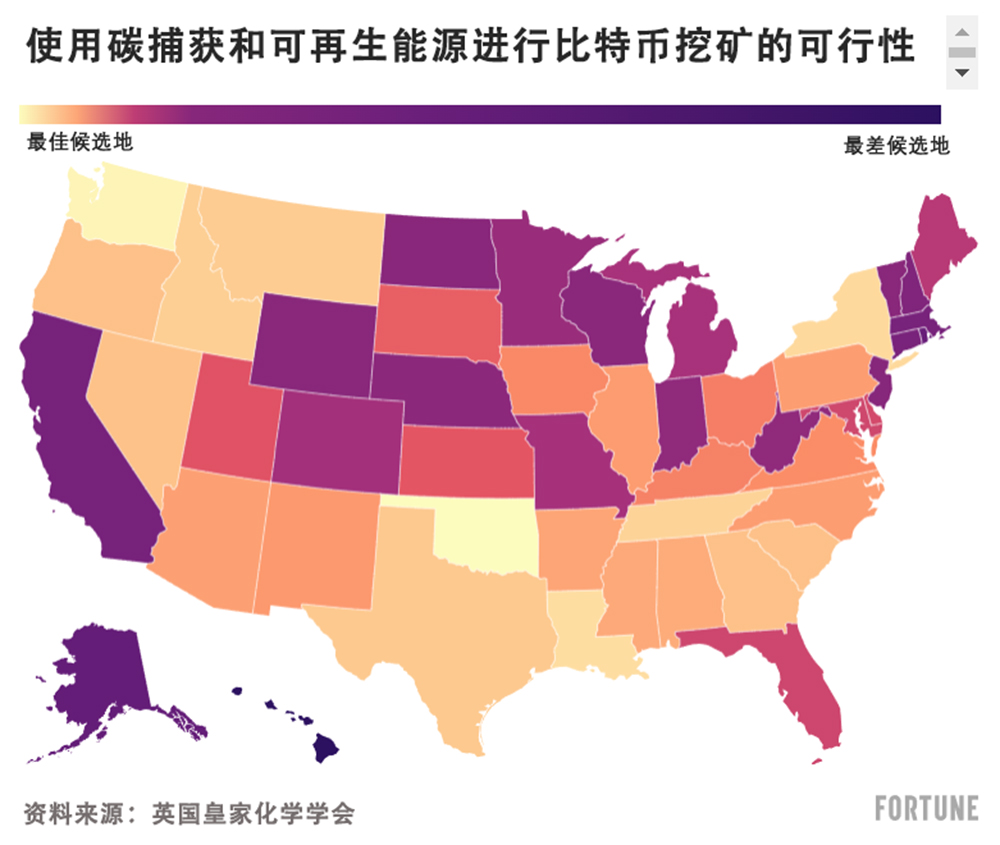
随着比特币(Bitcoin)矿工涌向美国,政界人士和环保人士都对这个能源密集型行业的生态成本提出了警告。今年9月,白宫发布了一份报告,称美国拥有全球约三分之一的加密货币挖矿业务,消耗了全美高达1.7%的电力,相当于所有住宅照明。
康奈尔大学(Cornell University)的研究人员进行的一项新研究认为,在优先考虑可再生能源、运营成本较低的州更有效地分配比特币挖矿业务,可以缓解对环境问题的担忧,从而有可能减轻损害。
随着电网增加对太阳能和风能等可再生能源的使用,并密切探索碳捕获技术,比特币挖矿能够加速可持续发展进程。
能源系统工程教授尤凤奇(音译)博士牵头开展了这项研究,希望推动打造与挖矿业务相关的更好的公共政策。
他说:“随着越来越多的挖矿设备进入美国,越来越多的公众正在考虑投资这些行业,这对气候和我们的能源系统有什么影响?”

比特币使用工作量证明共识机制:为了记录被称为区块链的公共分类账中的交易,不同的人(或矿工)竞相解决复杂的算法难题。获胜者验证区块并获得比特币奖励。
这一过程需要巨大的算力,其能源消耗相当于芬兰等国家的需求。它还导致了大量碳排放——每年估计为9,076万吨,相当于希腊的碳足迹。
近年来,由于中国等之前的比特币中心禁止挖矿,比特币业务已经转移到美国。比特币业务集中在得克萨斯州和纽约,因为那里的能源电网放松管制。这两个州分别占美国境内比特币算力的14%和19.9%。
康奈尔大学的研究发现,无论从成本还是排放的角度来看,美国目前的挖矿业务分布都是不合理的。
尤凤奇告诉《财富》杂志:“每个州都有自己的电力结构。一些州对水电的依赖程度较高,另一些州则对核能或天然气的依赖程度较高。
当他的团队研究不同州挖矿业务总成本(包括资本支出和运营费用)时,他们发现使用清洁能源和降低项目成本之间存在很强的相关性,尤说这令人惊讶,因为可再生能源通常被认为相对昂贵。
尤凤奇表示,展望未来,不仅从环境角度来看,而且从经济角度来看,将挖矿业务转移到可再生能源开发和利用更好的地方至关重要。
虽然上面的地图显示了短期内进行挖矿业务最理想的州——像华盛顿和纽约这样的地方是最佳候选地——但他们还分析了随着可再生能源政策支持的增加,情况可能会发生怎样的变化。在这种情况下,佛蒙特州和俄勒冈州等州将变得更加有利。尤凤奇补充说,得克萨斯州既不是最好的选择,也不是最坏的选择,因为该州与电网相关的碳排放相对较高。
虽然该研究不支持比特币挖矿,但它承认比特币挖矿很可能会存在下去——并且可以通过优化运营以减少碳排放和降低成本。
“理想情况下,如果他们只使用可再生能源进行比特币挖矿,那么我们就能够说他们不会对气候产生任何影响。”尤凤奇说。“但在实践中,当然,我们知道我们还没有达到将可再生能源100%接入电网的阶段。”(财富中文网)
译者:中慧言-王芳
随着比特币(Bitcoin)矿工涌向美国,政界人士和环保人士都对这个能源密集型行业的生态成本提出了警告。今年9月,白宫发布了一份报告,称美国拥有全球约三分之一的加密货币挖矿业务,消耗了全美高达1.7%的电力,相当于所有住宅照明。
康奈尔大学(Cornell University)的研究人员进行的一项新研究认为,在优先考虑可再生能源、运营成本较低的州更有效地分配比特币挖矿业务,可以缓解对环境问题的担忧,从而有可能减轻损害。
随着电网增加对太阳能和风能等可再生能源的使用,并密切探索碳捕获技术,比特币挖矿能够加速可持续发展进程。
能源系统工程教授尤凤奇(音译)博士牵头开展了这项研究,希望推动打造与挖矿业务相关的更好的公共政策。
他说:“随着越来越多的挖矿设备进入美国,越来越多的公众正在考虑投资这些行业,这对气候和我们的能源系统有什么影响?”
比特币使用工作量证明共识机制:为了记录被称为区块链的公共分类账中的交易,不同的人(或矿工)竞相解决复杂的算法难题。获胜者验证区块并获得比特币奖励。
这一过程需要巨大的算力,其能源消耗相当于芬兰等国家的需求。它还导致了大量碳排放——每年估计为9,076万吨,相当于希腊的碳足迹。
近年来,由于中国等之前的比特币中心禁止挖矿,比特币业务已经转移到美国。比特币业务集中在得克萨斯州和纽约,因为那里的能源电网放松管制。这两个州分别占美国境内比特币算力的14%和19.9%。
康奈尔大学的研究发现,无论从成本还是排放的角度来看,美国目前的挖矿业务分布都是不合理的。
尤凤奇告诉《财富》杂志:“每个州都有自己的电力结构。一些州对水电的依赖程度较高,另一些州则对核能或天然气的依赖程度较高。
当他的团队研究不同州挖矿业务总成本(包括资本支出和运营费用)时,他们发现使用清洁能源和降低项目成本之间存在很强的相关性,尤说这令人惊讶,因为可再生能源通常被认为相对昂贵。
尤凤奇表示,展望未来,不仅从环境角度来看,而且从经济角度来看,将挖矿业务转移到可再生能源开发和利用更好的地方至关重要。
虽然上面的地图显示了短期内进行挖矿业务最理想的州——像华盛顿和纽约这样的地方是最佳候选地——但他们还分析了随着可再生能源政策支持的增加,情况可能会发生怎样的变化。在这种情况下,佛蒙特州和俄勒冈州等州将变得更加有利。尤凤奇补充说,得克萨斯州既不是最好的选择,也不是最坏的选择,因为该州与电网相关的碳排放相对较高。
虽然该研究不支持比特币挖矿,但它承认比特币挖矿很可能会存在下去——并且可以通过优化运营以减少碳排放和降低成本。
“理想情况下,如果他们只使用可再生能源进行比特币挖矿,那么我们就能够说他们不会对气候产生任何影响。”尤凤奇说。“但在实践中,当然,我们知道我们还没有达到将可再生能源100%接入电网的阶段。”(财富中文网)
译者:中慧言-王芳
As Bitcoin miners flock to the United States, both politicians and environmental advocates warn of the ecological costs of the energy-intensive industry. In September, the White House released a report citing that the U.S. hosts about a third of the world’s crypto mining operations, consuming up to 1.7% of the nation’s electricity, equivalent to all residential lighting.
A new study by researchers at Cornell University argues that environmental concerns can be assuaged by more efficiently distributing Bitcoin mining in states that prioritize renewable energy and have lower operational costs, potentially mitigating damage.
As electrical grids ramp up usage of renewable energy sources like solar and wind, and closely explore carbon capture technology, Bitcoin mining can become more sustainable at an accelerated pace.
Dr. Fengqi You, a professor of energy systems engineering, spearheaded the research in the hope of driving better public policy tied to mining operations.
“As more of these mining facilities are coming to the U.S., and more of the public is thinking about investing in these sectors,” he said, “what are the consequences to the climate and to our energy systems?”
Bitcoin uses a proof-of-work consensus mechanism: For transactions in the public ledger known as a blockchain to be recorded, different people—or miners—race to solve complex algorithms. The winner validates the block and is rewarded with Bitcoin.
The process requires immense computing power, with energy consumption equivalent to the demands of countries such as Finland. It also results in massive carbon emissions—an estimated 90.76 million tons annually, comparable to the carbon footprint of Greece.
In recent years, operations have moved to the U.S. as previous hubs such as China have banned Bitcoin mining. They’ve become concentrated in Texas, with its deregulated energy grid, as well as in New York. Respectively, the two states account for 14% and 19.9% of Bitcoin’s computing power within the United States.
The study from Cornell found that the current distribution of mining operations in the United States doesn’t make sense from either a cost or emissions standpoint.
“Every state has its own electricity mix,” You told Fortune. Some states have higher reliance on hydropower, others on nuclear or natural gas.
When his team looked at total costs for mining operations in different states, including capital expenditure and operating expenses, they found a strong correlation between using clean energy and lowering project costs, which You said was surprising because renewables are often considered comparatively expensive.
Moving forward, he said it will be critical to move mining operations to locations with better renewable capabilities, not just from an environmental standpoint, but also an economic one.
While the map above shows the best states for the near term—with places like Washington and New York as top candidates—they also conducted an analysis of how the picture might change with increased policy support for renewable energy. In that scenario, states including Vermont and Oregon become more favorable. Texas, You added, isn’t the best or the worst choice because of its relative carbon emissions associated with its electrical grid.
While the study doesn't endorse Bitcoin mining, it recognizes that it’s likely here to stay—and operations can be optimized to decrease carbon emissions and lower costs.
“Ideally, if they’re going to use only renewables for mining Bitcoin, then we could argue they will not have any influence on the climate,” You said. “But in practice, of course, we know that we are not yet at the stage of a 100% renewable energy grid.”






